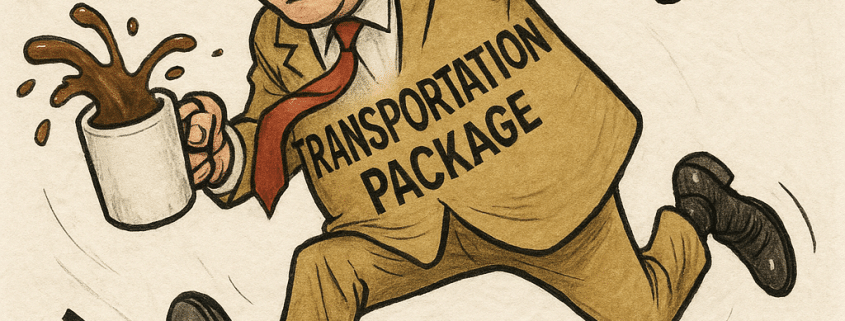What a ‘TRIP’
Requiem for a Transportation Package
TRIP. Never has a piece of legislation been more aptly named. The Transportation Reinvestment Package tripped all over itself during the 2025 Legislative Session before crashing to the pavement with a thud in the final week at the Capitol.
Democrats, who saw their own Big Beautiful Bill splattered before their eyes, blamed Republicans. The Republicans, in turn, chastised Democrats for reaching into taxpayer wallets for all their solutions to the state’s problems. It marked the first time in a quarter century that a major transportation bill failed to cross the finish line.
Time for the Incident Response Team to show up, clear the debris, and summon the crash investigation specialists.

It’s not as if safety features and warning signs weren’t in place at the accident scene. The clearance for top-heavy loads on the bridges — those that the $1.5 billion bill had to pass under — was clearly visible. Yellow warning lights were flashing when Republicans weren’t at the table crafting agreement on every aspect of the plan. The sudden acceleration of the bill, unveiled with just three weeks left in the session, was evidence that speed was a contributing factor.
Adding insult to injury, in the final 48 hours legislative leaders attempted to pass a small funding bill to keep ODOT workers on the job and programs in place until a new transportation package could be crafted in a special session. It was trashed in an expedited hearing by local government trade associations who were angered that they didn’t get a piece of the action. It is a dog-eat-dog world when local, regional and state governments are salivating over the same bone. The message to ODOT: “If we don’t get bail out money, you don’t get any either.” It was a Pavlovian response from those who quickly forgot how many state-owned streets pierce through their member cities and counties.
Portland Mayor Keith Wilson was one of those pulling the rug out of ODOT in the hearing yet appearing stunned a few days later when ODOT announced that as a result it could no longer fund the $4 million homeless camp removal program on ODOT-managed streets in Portland. “I am deeply alarmed,” Wilson said.

Looking ahead, a special session appears on the horizon, likely during legislative days in September. Success in such an endeavor will require discipline, engagement, commitment, and a willingness to bite your lip at times and compromise.
The process begins with the players in the room. They must be collaborators, not combatants. The number of participants must also not be too unwieldly. Too many cooks spoil the broth. The perfect recipe would be a “Gang of 8,” with two Republicans and two Democrats from each caucus. The public record is significantly voluminous for all to sift through; the focus now is on cutting a viable deal and then selling it to their respective caucuses to gain enough support for passage. The package should embrace ideas from both party perspectives including:
- Identify the Objectives/Project Specificity. Lawmakers, and the public at large, like to know what projects need to be addressed and when they can be done. It is a mistake to lead with the question of how much money we should raise. If we are emphasizing maintenance and preservation, nail the specific projects. They don’t all need to be listed in the bill but submitting written testimony into the record showing what streets, bridges, intersections, etc., will be addressed if funding is approved will allow all legislators to tout wins for their constituents. Cities and counties should be directed to outline their own project plans if funding is approved. Revenue discussion should follow the needs discussion and agreement, not the other way around.
- New revenue. The mantra that ‘no new revenue’ is needed is deeply flawed. But it should be whittled down from the original components in HB 2025 with an understanding that transportation funding is going to have become a biennial exercise, not an every 8–10-year blowout package.
- Repurpose existing revenue. Republicans proposed changing direction on some programs, many tied to environmental initiatives. It went too far but had a measure of merit. Democrats should accept some diversion to address the immediate crisis at hand and demonstrate a collaborative approach.
- Road User Charge (RUC). One of the best received elements in HB 2025, according to a recent poll, was implementing the RUC beginning with all electric vehicles. It is a fairness issue that the public understands. EV’s don’t pay gas tax for using the roads so RUC provides the equalizer.
- Accountability. Both Democrats and Republicans proposed different forms of accountability measures for ODOT. It is baffling that the Legislature needs to tell an executive agency how to be accountable. Agency leadership should have been proactive rather than be told how to be accountable. But we are where we are. The best approach now is to blend the two legislative proposals together.
Finally, the participants. I am going to go out on a limb and propose the following legislators based solely on my own experience in putting transportation packages together, and the collaborators needed to achieve the goal. Others could fit the bill, but these legislators are suggested based on my own observations on how they collaborated with others. In my opinion this is now a job for the rank and file, not top leadership.
Oregon Senate Democrats: Kate Lieber and Mark Meek. Senate Republicans: Bruce Starr and Dick Anderson. House Democrats: Nathan Sosa and John Lively. House Republicans: Lucetta Elmer and Kevin Mannix.
I believe this group has the negotiating chops, and collaborative mindset, to produce a successful agreement. Time to get to work.


